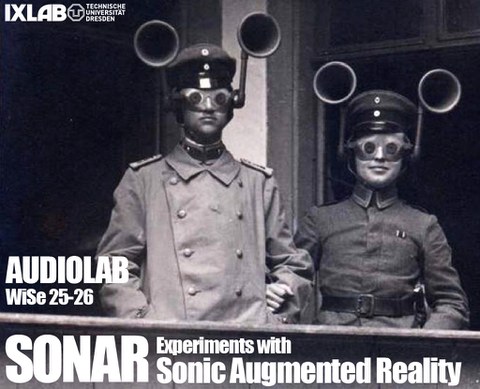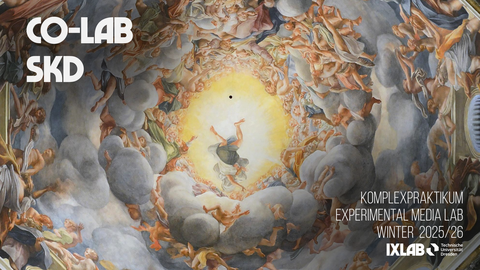Seminars, Workshops and Lectures
Winter Semester 2025-26
- Einschreibungen für Einführung in die Mediengestaltung via OPAL hier
- All other Course Enrolments via OPAL here. For praktika and seminar, enrolments are limited. IMPORTANT: enrolment via SELMA is not recognised as course enrolment. (But SELMA enrolments are needed for exams registrations).
For (Research/Team/..)-Projects or other write us an e-mail. - For live updates on IXLAB courses and news, subscribe to the matrix room #ixlab:tu-dresden.de
-
Our classes are listed in the Course Catalog as "Gestaltung immersiver Medien" in the Institute Software- und Multimediatechnik
Timetable (to be finalised)
| Mon | Tue | Wed | Thu | Fri | ||
|---|---|---|---|---|---|---|
| 1. DS | 07:30 - 09:00 | |||||
| 2. DS | 09:20 - 10:50 | EMG Übung |
||||
| 3. DS | 11:10 - 12:40 | EMG Übung |
FoVR Vorlesung |
|||
| 4. DS | 13:00 - 14:30 | XMLab 1 TD |
||||
| 5. DS | 14:50 - 16:20 | FoVR Übung |
XMLab 2 |
EMG Vorlesung |
AudioLab | |
| 6. DS | 16:40 - 18:10 | FoVR Übung |
KP - Komplexpraktikum (Practical Course)
Course Information
| Type | Vorlesung und Übung (2|1|0) |
|---|---|
| Language | deutsch |
| Lecturer | Matthew McGinity |
| Assessment | Klausur und Semesterarbeit als Mappe |
| Time&Place | Mi. 5.DS, BAR/0205/H |
| Enrolment | OPAL |
Erster Termin: 15.10.2025
Tutorials starten eine Woche später
Die Inhalte der Vorlesung sind Themen im Bereich interaktiver Medien: Print-Raster, Web-Raster, Werbung, Multi-Media-Systeme, Animation, Metaphern und Motive, Grafische Semiologie sowie Interface-Theorie. Die Studierenden erhalten die Fähigkeit, interaktive Oberflächen methodisch zu gestalten. Durch praktische Übungen erfahren die Studierenden vertiefte Fähigkeiten in der Mediengestaltung.
Die ordentliche Einschreibung für die Prüfung erfolgt via SELMA.
Die Einschreibung in die Übung und Kommunikation erfolgt via OPAL.
| Type | Lecture (90min per week) + Tutorial (90min per week) |
|---|---|
| Language | English |
| Lecturer | Matthew McGinity |
| Assessment | Exam format depends on module. Written exam: B-510/520/530/540, VMI-1a, CMS-VC-ELV1 and ELV2 Oral exam: VM1-8A, BAS7, VERT-3, VERT-7 |
| Time&Place |
Lecture: Thursdays, 3. DS. (11:10 - 12:40), Raum SCH/A215/H |
| Enrolment | OPAL (please enrol for the lecture, and for one of the tutorials) |
First Lecture: 16.10.2025
Tutorials start: 20.10.2025
Foundations of Virtual Reality provides a broad overview of the foundational theories, concepts and technologies involved in virtual reality. Topics covered include:
- Definitions and history of immersive media
- Active and spatial perception - vision, hearing, touch, somatic senses
- Stereo, head-tracked images and head-mounted visual displays
- 3D tracking technologies - noise, filtering, drift
- Sonic and haptic displays
- Interaction, locomotion and navigation in virtual spaces
- Software and application design for real-time VR
- Embodiment, social presence, measuring immersion
Tutorials will provide hands-on introduction to these topics using WebGL, Threejs and Unity.
| Type | Komplexpraktikum (0|0|4) |
|---|---|
| Language | english |
| Lecturers | Matthew McGinity, Lars Engeln |
| Assessment | Presentation, Prototype und Documentation |
| Time&Place | Thursdays, 14:50 - 16:20, E0046 APB |
| Enrolment | OPAL |
Lab starts: 23.10.2025
WiSe 2025-26 Theme: Sonic Augmented Reality
In Situ Binaural Audio (ISBA) is a powerful technique for creating sonic augmented reality experiences. Indeed, under certain conditions, it can be impossible to distinguish virtual sounds from real ones.
It has great potential for creative applications, from theatre to music, journalism, education and gaming, and is a powerful tool for studying aspects of perception and cognition.
In this class we will investigate ISBA from two perspectives.
Firstly, we will design and run a number of experiments to better understand ISBA. Under what conditions does it work well? When does it fail? What kinds of sounds work best? How can we measure it?
Secondly, we will explore possible applications of the technique.
Students will work in small groups to develop prototypes and design experiments.
| Type | Komplexpraktikum (0|0|4) |
|---|---|
| Language | Englisch, Deutsch |
| Lecturers | Lenard Opeskin, Torben Soeken |
| Assessment | Presentation, Prototype und Documentation |
| Time&Place | Lecture: Thursdays, 4. DS. (13:00 - 14:30), ZEU 150 |
| Enrolment | OPAL |
The Experimental Media Lab splits up into two groups, one as Co-lab with Technische Design and one as Co-lab with Staatliche Kunstsammlungen Dresden. Please choose only one.
Co-lab with TU Dresden Technische Design
Informatik students will join with industrial design students to develop prototypes and solutions to real world challenges.
We start 23th Octobre.
| Type | Komplexpraktikum (0|0|4) |
|---|---|
| Language | Deutsch, (English) |
| Lecturers | Brian Eschrich, Franziska Hannß |
| Assessment | Presentation, Prototype und Documentation |
| Time&Place | Lecture: Tuesdays, 5. DS. (14:50 - 16:20), APB E046 - IXLAB |
| Enrolment | OPAL |
The Experimental Media Lab splits up into two groups, one as Co-lab with Technische Design and one as Co-lab with Staatliche Kunstsammlungen Dresden. Please choose only one.
Lab starts: 21.10.2025
Co-lab with Staatliche Kunstsammlungen Dresden [SKD]
Wir entwickeln Museumsinstallationen in Kooperation mit den Staatlichen Kunstsammlungen Dresden.
More info coming very soon!
| Type | Research Project (0|0|8 or 12) |
|---|---|
| Language | English |
| This is for | Bachelor and Master Theses, Großer Beleg, aswell as individual and team research projects in INF-PM-FPA, INF-PM-FPG, CMS-PROJ, CMS-VC-TEA |
| Assessment | Presentations, Documentation and final Project |
| Time&Place | ongoing |
| Enrolment |
IXLAB is offering a range of individual and group Research Projects in the field of immersive media. Topics include theoretical and perceptual factors, technical challenges, design and interaction issues and novel applications of different manifestations of virtual and augmented reality. Application fields include archaeology, architecture, data visualisation, geospatial science, physiotherapy or psychotherapy, museums and libraries, music and film production, journalism or education and training.
Projects are available for all levels: Bachelor and Master Theses, Großer Beleg and individual and team research projects in INF-PM-FPA, INF-PM-FPG, CMS-PROJ, CMS-VC-TEA
See here for example Research Projects
| Type | Komplexpraktikum (0|0|4) und/oder Seminar (0|2|0) |
|---|---|
| Language | Deutsch |
| Lecturers | Franziska Hannß |
| Assessment | Durchführung und Dokumentation |
| Time&Place | tba |
| Enrolment | Bewerbungsemail an Franziska Hannß (Semester, Belegungswunsch, Motivation, Erfahrungen und Interessen). Die Parallelbelegung von KP und Seminar ist möglich. |
Erster Termin: tba (wird ab November sein)
Diese Lehrveranstaltung legt den Fokus auf die Durchführung der Veranstaltung OUTPUT.DD - die Projektschau der Fakultät Informatik. Zum 20. Mal präsentiert sich im kommenden Jahr die Fakultät Informatik mit dem bunten Format OUTPUT.DD. In vergangenen Jahren wurden neue Formate in die Veranstaltung integriert: Science Slam, Einreichung von Postern und das OUTPUT-Kino. Nun heißt es, diese neuen Formate zu verstetigen und spannende Inhalte zu generieren. Diese generiert ihr natürlich nicht selbst, sondern versucht die Forschenden der Fakultät als Beteiligte durch spannende und außergewöhnliche Akquisetätigkeiten zur Teilnahme zu gewinnen. Es ist also Kreativität, Teamgeist und Engagement gefragt!
Was ist OUTPUT.DD?
Ergebnisse aus Lehre und Forschung von Studenten und Mitarbeitern werden einer breiten Öffentlichkeit gezeigt. Die Besucher erwarten Installationen, Workshops, Vorträge, Präsentationen und Ausstellungen zum Entdecken, Erleben und Erforschen. Daneben bietet OUTPUT.DD die Möglichkeit, mit ansässigen Firmen über spannende Forschungsfragen ins Gespräch zu kommen.
Schwerpunkte:
- Akquise der fakultätsinternen Projekte / Einblick in die aktuelle Forschung an der Informatikfakultät
- Werbung für die Veranstaltung durch Printmedien und auf Social Media
- Veranstaltungsplanung / -management
- Veranstaltungsdesign / Ausstellungsdesign
Modules
| Bachelor | Master & Diplom | ||||||
|---|---|---|---|---|---|---|---|
| SWS | Informatik & Medien-informatik | Medien-informatik | Informatik | CMS | |||
| Vorlesung + Übung Einführung in die Mediengestaltung |
2|1|0 | B-450 | |||||
| Lecture + Tutorial Foundations of Virtual Reality |
2|2|0 | B-510 B-520 B-530 B-540 |
VMI-1A VMI-8A |
BAS7 VERT-3 VERT-7 |
CMS-VC-ELV1 CMS-VC-ELV2 |
||
| (Practical Course) Experimental Media Lab |
0|0|4 | B-510 B-520 B-530 B-540 |
VMI-1A VMI-4A VMI-6 VMI-7 VMI-8A E-4 |
VERT-3 MA-PR MA-FHI-XIM |
CMS-VC-ELV1 CMS-VC-ELV2 |
||
| (Practical Course) Audio Lab |
0|0|4 | B-510 B-520 B-530 B-540 |
VMI-4A VMI-6 VMI-7 VMI-8A E-4 |
VERT-3 MA-PR MA-FHI-APC |
|||
| Research Project Immersive Systems |
0|0|8 |
PM-FPA |
CMS-VC-TEA | ||||
| CMS Research Project Immersive Visualisation |
0|0|12 | CMS-PRO | |||||
Archived Semesters:
Summersemester 25
Wintersemester 24/25
Summersemester 24
Wintersemester 23/24
Summersemester 23
Wintersemester 22/23
Summersemester 22
Wintersemester 21/22
Summersemester 21
Wintersemester 20/21



